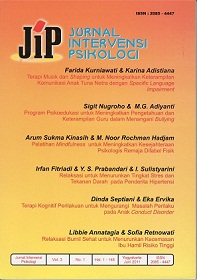Main Article Content
Abstract
Physical differential ability adolescents have difficulty to develop their potential so imply their psychological welibeing. The aim of this research was to examine the effect of mindfulness training to increase psychological welibeing of physical differential ability adolescents. The pretest-posttest experimental design were used in this research. Participants were 5 male clients stay at physically differential abibility rehabilitation center, 18-24 years old and got physical diferential ability cause by accident and illness. Results showed that mindfulness training was not significantly effective to increased psychological welibeing to participants. From pretest to posttest showed that z=-1.841 and p=0.06 (p< 0.05). From posttest to follow up showed that z=-0.135 dan p^O.893 (p<0.05). Qualitative abalysis showed that subject's psychological welibeing scale score lower than pretest because they didn't practice mindfulness regularly and feel anxious with the future. One subject got higher psychological welibeing scale score than pretest because practice mindfulness regularly, high motivation and proactive in mindfulness training process. For the future research should consider about mindfulness training time, evaluation and debriefing process
Key Word; Physical differential ability adolescents, Mindfulness training, Psychological welibeing
Article Details
Authors who publish with this journal agree to the following terms:
- Authors retain copyright and grant the journal right of first publication with the work simultaneously licensed under a Creative Commons Attribution-ShareAlike 4.0 International License that allows others to share the work with an acknowledgment of the work's authorship and initial publication in this journal.
- Authors are able to enter into separate, additional contractual arrangements for the non-exclusive distribution of the journal's published version of the work (e.g., post it to an institutional repository or publish it in a book), with an acknowledgment of its initial publication in this journal.
- Authors are permitted and encouraged to post their work online (e.g., in institutional repositories or on their website) prior to and during the submission process, as it can lead to productive exchanges, as well as earlier and greater citation of published work (See The Effect of Open Access).




